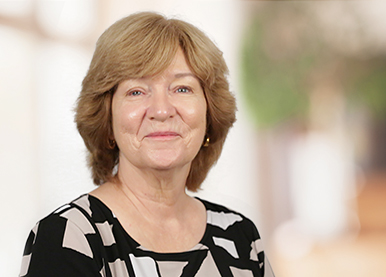
Veteran's Spotlight - Peg Davis
While she was serving in the United States Air Force, she felt a very strong sense of belonging within her military family. When she retired after 25 years of service, Peg hoped to work for a company that not only provided a similar sense of belonging, but also demonstrated an authentic care and concern for its employees. EviCore is grateful that Peg is now part of our family and in a position that allows her to use her experience and knowledge to make a positive impact on healthcare.
Learn more about Peg Davis and her journey from the Air Force to EviCore Healthcare.
1. What is your role at EviCore? What are some of the responsibilities associated with this role?
I am the Vice President of Clinical Operations, with oversight of EviCore's large nurse production staff which consists of about 850 clinical professionals. Many of these employees are in Clinical Reviewer positions; they utilize their clinical knowledge to provide case-review services for patients we serve.
2. How long did you serve in the military? What encouraged you to join?
I joined the Air Force in 1974 after realizing that I wanted opportunities different from those that were available to me. After taking a standardized test to determine what military role or department would be a good fit for me, I was assigned to Computer Operations. During the years of 1974-1979, I worked in Computer Operations, which was extremely interesting, because at the time, computers were nothing like they are today. It's amazing how much technology has advanced since then! After I served those 4 years on active duty, I tried working a civilian job at an insurance company. As I began to miss the sense of belonging I experienced in the Air Force, I decided to join the Air Force Reserve with a medical unit. I was in that position for about 7 years, working in Casualty Acceptance. During my time in the reserve, I was transferred to Personnel Management and gained E-8 Ranking. After 11 years of working in the Personnel Management area, I was relocated to Patrick Air Force Base, where I earned my commission as an Air Force Nurse Officer. At this time, I started attending school to earn a nursing degree, but it was not too long before I put my education on hold as I was deployed to Spain during Desert Storm. After I returned from deployment, I was able to finish my nursing degree and start working in hospitals and physician offices in the Melbourne, Florida area. I relocated my Reserve position to Patrick Air Force Base and finished my career there, retiring in 2001.
3. How do you think your military background prepared you for your current role?
During my time in the Air Force, I was blessed when it came to exposure to management training. In my current role, I manage people and resources every day, and I feel that my military experience helped me develop those skills. In the Air Force Reserves specifically, I gained an understanding of how valuable it is to invest in employees. It's not about just finding the right person for the job, it's also about ensuring that you do what you can to keep them and grow them in their career.
4. What career advice would you give to men and women who are working on transitioning from military roles to civilian jobs?
When you are looking to transition out of the military, make sure to ask yourself what is most important and interesting to you. Military members are used to being in a loyal atmosphere, among other service men and women, so finding an organization and team that promotes a strong and respectful environment can be extremely helpful.